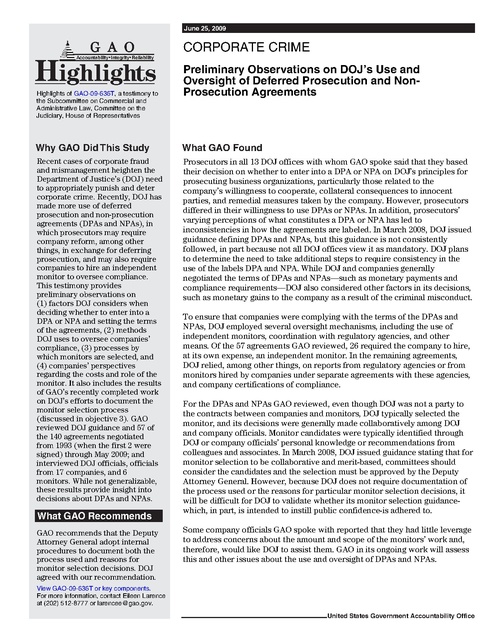Preliminary Observations on DOJ’s Use and Oversight of Deferred Prosecution and Non-Prosecution Agreements, GAO, 2009
Download original document:

Document text

Document text
This text is machine-read, and may contain errors. Check the original document to verify accuracy.
June 25, 2009 CORPORATE CRIME Accountability Integrity Reliability Highlights Highlights of GAO-09-636T, a testimony to the Subcommittee on Commercial and Administrative Law, Committee on the Judiciary, House of Representatives Preliminary Observations on DOJ’s Use and Oversight of Deferred Prosecution and NonProsecution Agreements Why GAO Did This Study What GAO Found Recent cases of corporate fraud and mismanagement heighten the Department of Justice’s (DOJ) need to appropriately punish and deter corporate crime. Recently, DOJ has made more use of deferred prosecution and non-prosecution agreements (DPAs and NPAs), in which prosecutors may require company reform, among other things, in exchange for deferring prosecution, and may also require companies to hire an independent monitor to oversee compliance. This testimony provides preliminary observations on (1) factors DOJ considers when deciding whether to enter into a DPA or NPA and setting the terms of the agreements, (2) methods DOJ uses to oversee companies’ compliance, (3) processes by which monitors are selected, and (4) companies’ perspectives regarding the costs and role of the monitor. It also includes the results of GAO’s recently completed work on DOJ’s efforts to document the monitor selection process (discussed in objective 3). GAO reviewed DOJ guidance and 57 of the 140 agreements negotiated from 1993 (when the first 2 were signed) through May 2009; and interviewed DOJ officials, officials from 17 companies, and 6 monitors. While not generalizable, these results provide insight into decisions about DPAs and NPAs. Prosecutors in all 13 DOJ offices with whom GAO spoke said that they based their decision on whether to enter into a DPA or NPA on DOJ’s principles for prosecuting business organizations, particularly those related to the company’s willingness to cooperate, collateral consequences to innocent parties, and remedial measures taken by the company. However, prosecutors differed in their willingness to use DPAs or NPAs. In addition, prosecutors’ varying perceptions of what constitutes a DPA or NPA has led to inconsistencies in how the agreements are labeled. In March 2008, DOJ issued guidance defining DPAs and NPAs, but this guidance is not consistently followed, in part because not all DOJ offices view it as mandatory. DOJ plans to determine the need to take additional steps to require consistency in the use of the labels DPA and NPA. While DOJ and companies generally negotiated the terms of DPAs and NPAs—such as monetary payments and compliance requirements—DOJ also considered other factors in its decisions, such as monetary gains to the company as a result of the criminal misconduct. What GAO Recommends GAO recommends that the Deputy Attorney General adopt internal procedures to document both the process used and reasons for monitor selection decisions. DOJ agreed with our recommendation. To ensure that companies were complying with the terms of the DPAs and NPAs, DOJ employed several oversight mechanisms, including the use of independent monitors, coordination with regulatory agencies, and other means. Of the 57 agreements GAO reviewed, 26 required the company to hire, at its own expense, an independent monitor. In the remaining agreements, DOJ relied, among other things, on reports from regulatory agencies or from monitors hired by companies under separate agreements with these agencies, and company certifications of compliance. For the DPAs and NPAs GAO reviewed, even though DOJ was not a party to the contracts between companies and monitors, DOJ typically selected the monitor, and its decisions were generally made collaboratively among DOJ and company officials. Monitor candidates were typically identified through DOJ or company officials’ personal knowledge or recommendations from colleagues and associates. In March 2008, DOJ issued guidance stating that for monitor selection to be collaborative and merit-based, committees should consider the candidates and the selection must be approved by the Deputy Attorney General. However, because DOJ does not require documentation of the process used or the reasons for particular monitor selection decisions, it will be difficult for DOJ to validate whether its monitor selection guidancewhich, in part, is intended to instill public confidence-is adhered to. Some company officials GAO spoke with reported that they had little leverage to address concerns about the amount and scope of the monitors’ work and, therefore, would like DOJ to assist them. GAO in its ongoing work will assess this and other issues about the use and oversight of DPAs and NPAs. View GAO-09-636T or key components. For more information, contact Eileen Larence at (202) 512-8777 or larencee@gao.gov. United States Government Accountability Office




